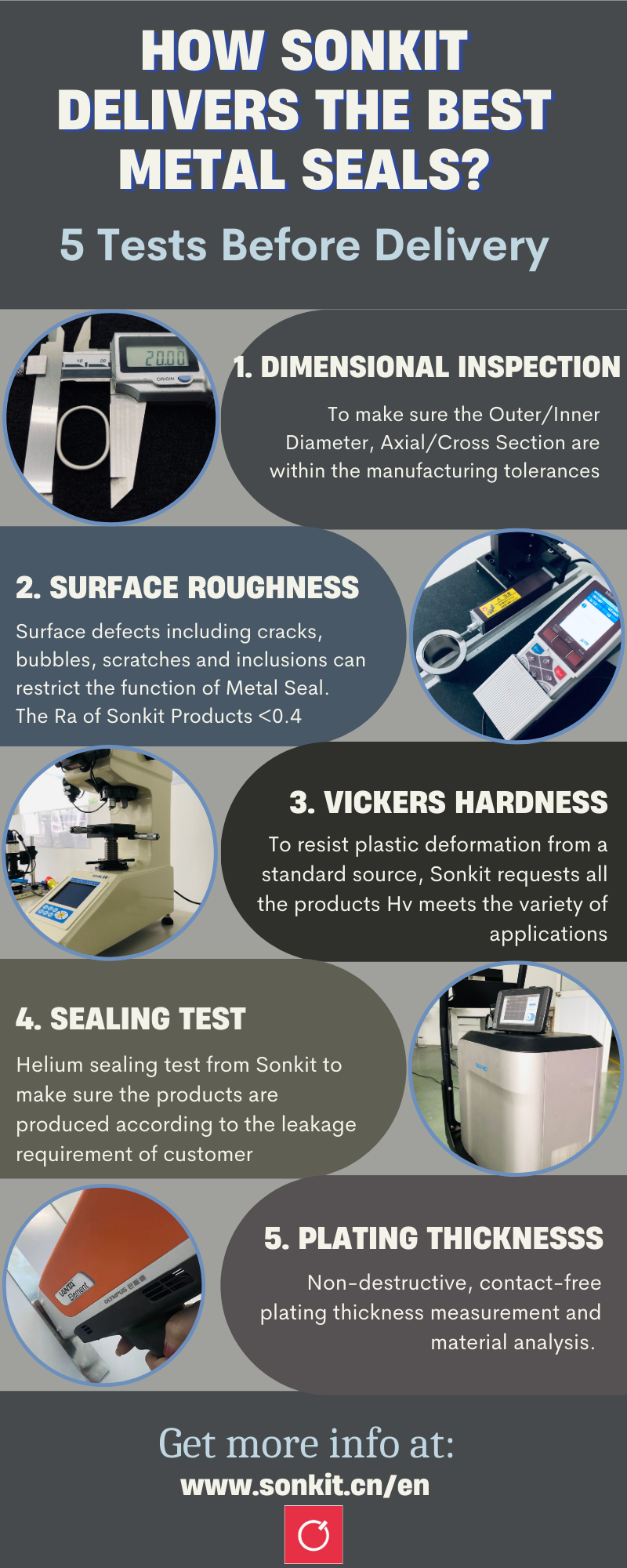
5 Tests Before Delivery - How Sonkit Delivers the Best Metal Seals?

To produce a high-quality metal ring seal, testing is crucial. It aids in the development of products that adhere to predetermined technical criteria. In other words, testing is a step that Sonkit product development teams must do in order to produce high-quality, long-lasting products. Most significantly, product testing can guarantee that a product is secure for industrial usage.
In order to guarantee that the characteristics of metal ring seals fulfill the specifications of a range of applications, Sonkit Industry test lab adheres to strict processes and rules.
Engineering of High Precision. Metal ring seals must be extremely precise. It is crucial to make sure that there are no faults because even a small mistake or consistency can affect the performance of a whole metal seal solution.
The Sonkit Industry test lab follows tight procedures and guidelines to ensure that the axial and cross sections of metal seals, as well as their outer and inner diameters, are within the production tolerances.
Cracks, bubbles, scratches, and impurities on the surface might limit the functionality of Metal Seal.
Surface roughness and function are intimately related in many metal seal applications; for example, if two surfaces are in close movement contact, their roughness will alter their sealing or wear qualities. This could imply that "the smoother the better" applies. However, this isn't necessarily the case because other variables might be at play.
Wear will happen when two surfaces that are moving together—like a shaft and its bearing—are lubricated. If the surfaces are rough, the peaks will eventually wear away, making the surfaces smoother. Since metal is being removed, the fit of the two components will alter more quickly than if the finish was perfect from the beginning. Conversely, some components, such as clamping mechanisms or a pin with an "interference fit," rely on friction to function.
Normally, we require the roughness of Sonkit Metal Seals: Ra < 0.4
Hardness is a characteristic of a metal seal, not a fundamental physical trait. Its definition is "resistance to indentation," and its measurement is the indentation's permanent depth. Sonkit demands that every item's hardness fulfill the range of uses in order to withstand plastic deformation from a standard source.
Vickers hardness testing, commonly known as a microhardness test, is a technique employed by Sonkit and is typically used for tiny components, thin sections, or case depth work.
A sealing test is used to ensure that metal seal products are produced in accordance with the customer's leakage requirements.
To discover little or bigger leaks in a metal seal solution, Sonkit utilizes helium leak testing. The concentration of helium, which is utilized as a tracer gas, is monitored.
Sonkit may do a leak test using this method to identify tiny breaches. This should result in longer product life. High vacuum testing, which enables leak test thresholds to be set as low as 110-12mbar.l.sec-1, or sniffing, which is often used for helium leaks down to 110-6mbar.l.sec-1, are the two fundamental procedures. For comparison, 1 cubic millimeter per second is roughly equivalent to 110-3 mbar litres per second, or 1cc is equal to 1mbar litres per second.
Sonkit lab often does high vacuum testing.
To gauge plating thickness, a coating thickness check is utilized. Due to its influence on the coating process, quality, and expense, plating thickness is perhaps the most important parameter in the coatings business. Measurements of coating thickness can be used to assess the anticipated lifespan of a coating, the product's look and functionality, and its conformity with a number of international standards.
There are two ways to test the coating thickness of metal seals: destructively (by cutting the coating to the substrate with a cutter) and non-destructively (by utilizing technologies like magnetic, magnetic induction, and eddy current thickness measurement that doesn't harm the coating or the substrate).
Non-magnetic metal surfaces, such as stainless steel or aluminum, as well as magnetic steel surfaces, may both be used to measure the non-destructive coating thickness.
Non-destructive, contact-free coating thickness measurement and material analysis are done by Sonkit lab.

For more information on metal ring seals visit our website and for more great information like the above, follow Sonkit on both Facebook and LinkedIn.